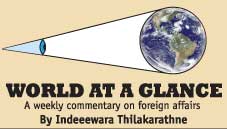|

Europe's debt crisis at bursting point?
In the words of the World Bank, which published it in a report issued
this week ("Golden Growth: Restoring the lustre of the European Economic
model", here), Europe is the world's
"lifestyle superpower". As opposed to America, which spends almost as
much as the rest of the world put together on defence, Europe spends
more than the rest of the globe combined on social policies.
In many ways this is an admirable aspect of Europe's economic model,
which combines high living standards with high standards of social
welfare. The trouble is, such spending is helping to bankrupt
governments not least because those very same caring policies ensure
that Europeans live longer, requiring more expenditure on health care
and the payment of pensions for more years.
Anybody who wants to understand the strengths and weaknesses of
European economies in this time of crisis would do well to read the
report.
First the strengths. Europe, say the authors, invented a unique
"convergence machine" by admitting successive waves of poorer countries
and quickly raising their standards of living. Convergence has been
accelerated by the free flow of trade and capital within the European
Union.
Between 1950 and 1973, Western European incomes converged quickly
towards those in the United States. Then, until the early 1990s, the
incomes of more than 100 million people in the poorer southern
periphery-Greece, southern Italy, Portugal, and Spain grew closer to
those in advanced Europe. With the first association agreements with
Hungary and Poland in 1994, another 100 million people in Central and
Eastern Europe were absorbed into the European Union, and their incomes
increased quickly. Another 100 million in the candidate countries in
Southeastern Europe are already benefiting from the same aspirations and
similar institutions that have helped almost half a billion people
achieve the highest standards of living on the planet. If European
integration continues, the 75 million people in the eastern partnership
will profit in ways that are similar in scope and speed.
Yet this convergence machine is spluttering, and deep reforms are
needed. Much effort has been expended on explaining the nature of the
financial crisis of the past two years. The sharpest and most concise
analysis I know of is a recent policy brief by Jean Pisani-Ferry,
director of the Bruegel think tank in Brussels ("The euro crisis and the
new impossible trinity", here). This argues that the problems are deeper
than a lack of fiscal discipline: there is a flaw in the way the euro
zone was designed, without a lender of last resort, without joint bonds
and with a vicious feedback loop that weakens both sovereigns and their
banks. There is a tendency in Brussels to think that, if only the euro
zone were to make the leap to federalism, all would be solved. Far from
it.
The World Bank report shows that Europe has deep structural flaws to
contend with. Perhaps most worrying is the slowdown in labour
productivity, the underlying driver of economic growth over the long
term.
It shows how foreign direct investment was abruptly redirected from
southern countries to the new member states in the east. Mediterranean
members faced a triple challenge: they were hit hard by globalisation
and the loss of low-tech industries such as textiles; they faced
competition from cheaper labour in ex-communist members; and the
adoption of the euro made it harder for them to adjust through
devaluation. Yet Club Med has only itself to blame.
Europe's states are not big spenders on either health or education.
The variation among countries stems from a difference in spending on
pensions and social assistance. Europe's countries also differ how they
tax these benefits; Northern European countries tax the social security
benefits of people with high incomes more than others in Europe. After
taxes are considered, the southern periphery is the biggest social
spender in Western Europe. But the reason why Europe spends more than
its peer on public pensions is the same in the north, center and south.
This is not because Europe has the oldest population (Japan's is much
older) nor because of higher pension benefits (annual subsidies per
pensioner are about the same in Greece as in Japan). It spends more
because of easier and earlier eligibility for pensions.
So the outlook is gloomy. Even with greater productivity, even if
governments can reduce unemployment and bring more women into the
workforce, Europeans will have to stay in work for many more years. Even
so, the workforce will decrease. So Europeans will have to rethink
migration policies too.
Pervez Musharraf postpones Pakistan return, says aide
Musharraf had previously vowed to end his self-imposed exile and fly
back to Pakistan by the end of this month to revive his political
career.
He faces arrest on arrival as he is accused of failing to provide
adequate security for former PM Benazir Bhutto ahead of her
assassination in 2007.
The former military ruler, who stepped down in 2008, denies
wrongdoing.
On Friday Pakistan's Prime Minister Yousuf Raza Gilani repeated that
Musharraf would be arrested if he did return.
Mohammad Saif, general secretary of Musharraf's All Pakistan Muslim
League, told journalists in Dubai: "Gen Musharraf will return to
Pakistan, that's for sure.
"But we are waiting for the tension between the government and the
Supreme Court to subside. He told journalists in Dubai that the
government would seek to use Musharraf's return to divert attention from
its failures. |

